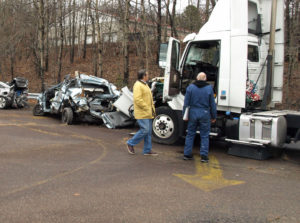How to File a Truck Accident Lawsuit
 Every time we get in our car, whether we’re going to work, to pick up the kids, to dinner, or anything in between, we expect to arrive safely at our destination. Most of the time, this is exactly what happens. But the devastating truth is that car accidents are a very real risk any time you’re on the road.
Every time we get in our car, whether we’re going to work, to pick up the kids, to dinner, or anything in between, we expect to arrive safely at our destination. Most of the time, this is exactly what happens. But the devastating truth is that car accidents are a very real risk any time you’re on the road.
While all accidents are terrifying, accidents involving trucks and other commercial motor vehicles are particularly dangerous. A truck accident is likely to cause far more damage and more serious injuries than most other kinds of motor vehicle accidents, given the size and weight of something like a semi-truck. It’s not uncommon for victims to endure something as serious as a traumatic brain injury.
Accidents involving large trucks can be life-changing events for all those involved, and in most cases, the inhabitants of passenger vehicles are the ones who bear the brunt of the damage.
If you or a loved one has experienced a truck accident, you may be wondering what your next steps are. How do you get maximum compensation for things like medical bills? Does insurance help? Do you have to go to court? We know this is an overwhelming time, and we’re here to walk you through the process of filing a truck accident lawsuit step by step.
Remember, don’t hesitate to contact a truck accident lawyer at Munley Law at any time to discuss your case. You’re always entitled to a free initial case evaluation.
When Should I File a Truck Accident Lawsuit?
In some cases, you may not need to file a truck accident lawsuit in order to secure the compensation you need. For more minor truck accidents, things may be settled entirely through insurance. One of the first things to do after any accident is to file an insurance claim — either with your own insurance provider or the at-fault driver’s insurance provider, depending on where you live and what kind of insurance you have. Insurance adjusters will then review the claim and the accident report, and ultimately issue compensation based on the details of the case.
However, if your accident results in serious injuries, or even death, it’s very possible you will not be able to get the compensation you need and deserve via insurance alone. Your own insurance coverage or the other driver’s insurance coverage may be insufficient to meet your needs — in a serious accident, things like medical bills and lost wages add up quickly, not to mention the costs of your pain and suffering. In a situation such as this, filing a truck accident lawsuit may be in your best interest.
If you’re unsure about whether filing a personal injury lawsuit is the best choice for you, don’t hesitate to contact a Munley Law truck accident attorney. You are always entitled to a free case evaluation, with no expectation to continue the relationship if you choose not to. We are ready and waiting to take your call.
What You Should Know Before Filing a Truck Accident Claim
 First and foremost, there are a few questions you’ll need to answer as you prepare to file your truck accident claim.
First and foremost, there are a few questions you’ll need to answer as you prepare to file your truck accident claim.
Are You Within the Statute of Limitations?
Firstly: are you still within the statute of limitations? Every state puts a time limit on how long after a truck accident you can file a suit, so before moving forward, you need to make sure the statute of limitations has not run out. In Pennsylvania, you have two years to file a truck accident claim, though it’s always best to do so as soon as possible. If the statute of limitations passes before you are able to file a claim, your claim will be denied and you will not be able to proceed with a lawsuit. That’s why it’s important to file a personal injury lawsuit as soon as possible.
What Kind of Car Insurance Do You Have?
The type of coverage you have through your insurance company impacts the ways in which you can receive compensation. You’ll need to identify what kind of coverage you carry in order to proceed. For instance, some states dictate that you must file a claim with your own insurance company after an accident, regardless of who is at fault.
In many states, the victim can file a claim with the at-fault driver’s insurance company. In Pennsylvania, drivers have the unique experience of being allowed to choose what kind of coverage they want. Drivers that have limited tort coverage face more barriers to suing another driver; generally, these drivers can only sue for economic damages, like medical bills and lost wages, but not for non-economic damages like pain and suffering. Drivers with full tort insurance can sue for both kinds of damages.
It’s not uncommon for insurance adjusters to start contacting victims immediately after the accident. Remember, insurance adjusters are always looking for a reason to pay you as little as possible. If they contact you, they may try to pressure you into giving a statement or admitting some degree of fault. Keep these conversations factual and don’t fall into any traps. Better yet, direct all contact with the insurance adjusters to your personal injury attorney, so they can mediate.
Who Was At Fault In the Truck Accident?
One of the most important steps in a truck accident suit is determining (and being able to prove) fault. In some cases, all fault may lie entirely with one party. For instance, you may be dealing with a truck accident case in which the truck driver was intoxicated behind the wheel, swerved into oncoming traffic, and crashed their truck into your passenger vehicle. In a truck accident case like this, the fault seems to lie clearly and solely with the truck driver.
But, of course, it’s not always so straightforward. More than one party may be at fault, or the fault may lie with someone other than the truck driver. For example, a truck driver falls asleep behind the wheel and collides with your vehicle. It is later revealed that the driver was under orders by the trucking company to drive past the required hours of service regulations. In this case, the truck company may be held responsible for the accident.
How Do I File a Truck Accident Lawsuit?
 If you are interested in filing a truck accident lawsuit, it’s helpful to know what the process looks like. Here are the steps it takes to file a truck accident lawsuit:
If you are interested in filing a truck accident lawsuit, it’s helpful to know what the process looks like. Here are the steps it takes to file a truck accident lawsuit:
Hire a Truck Accident Lawyer
If you have experienced a truck accident and are interested in filing a lawsuit against the truck driver, trucking company, or any other party, your best chance at success involves an experienced truck accident lawyer. Truck accident lawsuits can be incredibly complex, and working with a truck accident attorney ensures you’ll have guidance and support every step of the way.
File the Lawsuit
The next step is for your truck accident attorney to draft a formal complaint that will be delivered to the defendant or defendants. This complaint will state the allegations being made against the defendant, a description of the event that occurred, and the compensation that’s being requested. It will also include the legal theories that are being used to support the plaintiff’s claims.
After the complaint is delivered to the defendant, they have 20 days in which to reply.
Discovery
The discovery phase of the lawsuit process involves gathering evidence that can help support your truck accident lawsuit. During this time, the attorneys on both sides will investigate the case and dive deep into gathering all necessary evidence and documentation. Evidence that may be a part of this process includes:
- Photographs of the accident scene
- Photographs of your injuries
- Medical bills
- Evidence of lost wages
- The police report
- Witness testimony
- The truck’s maintenance records
- Logs recording hours of service
- Data from the truck’s electronic data recorder
- The driver’s personnel file
- The driver’s drug and alcohol test results
- And more
In the discovery phase, both the defendant’s and plaintiff’s teams can send each other interrogatories, which are essentially questions about the case that must be answered. Both sides must also share their discovery with each other.
At this point, the judge does have the right to issue what is known as a summary judgment. This is essentially a judgment made solely by looking at the evidence, without a trial — this may occur if the judge feels the evidence is very clearly in favor of one party.
Settlement or Trial
At any point during an accident lawsuit, a settlement agreement may be (and very likely will be) reached. It’s actually fairly rare for a personal injury case to necessitate a trial; the vast majority of these cases are settled out of court.
A settlement occurs when both sides come to an agreement about compensation. Typically, the plaintiff will lay out in their initial complaint that they’re seeking a particular amount in damages after the truck accident. The defendant, whether that’s the truck driver, the trucking company, or another party, will usually then respond with a counteroffer. This process continues until both sides agree on a number. Working with an experienced truck accident lawyer during this process gives you the best chance of securing full and fair compensation.
Although most truck accident lawsuits do end in a settlement, going to court is of course a possibility. For this reason, it’s important to work with a truck accident lawyer that has hands-on court experience, and not solely experience negotiating settlements.
Who Can Be Held Responsible For a Truck Accident?
One of the key elements of all truck accident lawsuits is determining who is at fault. In some cases, multiple parties may share varying degrees of fault for the same accident. Some of the parties who could possibly be at fault in your personal injury lawsuit regarding your truck accident include:
Truck Drivers
Of course, it’s possible for the truck driver themselves to be responsible for your truck accident. A negligent truck driver may cause an accident by driving recklessly, driving while fatigued, driving under the influence, or doing any number of irresponsible acts.
The Trucking Company
Trucking companies can most certainly hold fault when truck collisions occur. There are a great number of federal regulations regarding how these companies must operate; breaking one of these regulations is both illegal and incredibly dangerous. They must ensure their fleet is in safe working condition, that their drivers meet a certain standard and more. A truck accident can occur when the trucking company breaks a rule such as forcing drivers to stay on the road longer than required.
The Truck Manufacturer
The company that makes the truck itself may be held responsible if a truck accident is caused by a design flaw or manufacturing error that could or should have been prevented.
The Loading Company
The trucking industry has specific regulations for how each truck and each item must be loaded. Different materials are required to be secured differently, and all trucks have a specific weight limit. If a truck is improperly loaded by the loading company, or if the truck surpasses a given weight limit, the company could be held responsible if an accident occurs.
Another Driver
Sometimes, truck collisions occur because of another driver on the road. For instance, another driver could be driving recklessly, leading to a collision with a truck, which then leads to a collision with your car. In this case, the other driver would likely be responsible for the accident.
Why Choose Munley Law?
 If you or a loved one has suffered injuries from a truck accident, you are not alone. We know that truck accident claims can feel overwhelming, but we’re here to help. At Munley Law, we are experts in all things personal injury, and we will fight tirelessly to make sure your truck accident lawsuit is a success.
If you or a loved one has suffered injuries from a truck accident, you are not alone. We know that truck accident claims can feel overwhelming, but we’re here to help. At Munley Law, we are experts in all things personal injury, and we will fight tirelessly to make sure your truck accident lawsuit is a success.
At Munley Law, we have a stellar track record of securing full and fair compensation for our clients through highly satisfactory settlements. We will work around the clock to make sure your truck accident case is taken seriously, and to give you the support you need as you navigate this process.
If you were involved in a truck accident, do not wait. Contact a truck accident lawyer at Munley Law today for a free consultation.

Marion Munley
Marion Munley is recognized for her compassionate representation of catastrophically injured clients and her steadfast dedication to them and their families. Her advocacy has produced numerous multimillion-dollar recoveries, including one of the largest trucking accident settlements on record. Marion is Triple Board Certified by the National Board of Trial Advocacy in Civil Trial, Civil Practice, and Truck Law, and since 2023 has been named one of Pennsylvania’s Top 10 Super Lawyers by Super Lawyers.









